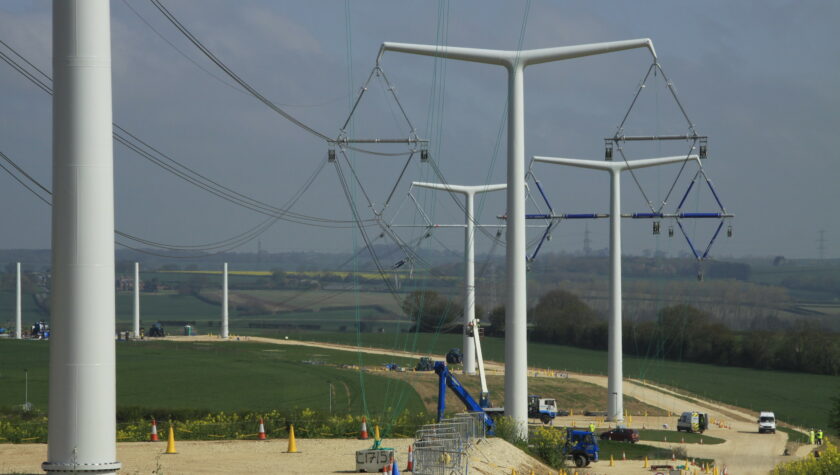A new data platform to share environmental information and effective ways of addressing the impact of proposed infrastructure projects will enable stronger protection for natural habitats and speed up schemes crucial to the net zero transition, according to a new report by the National Infrastructure Commission.
The review by the government’s official infrastructure advisers also recommends local communities are offered more tangible direct benefits for hosting infrastructure that supports national objectives. A menu of benefits for hosting major schemes might include proximity based payments for households or funding for local projects. The Commission says the mandatory adoption of such a framework by developers would provide greater consistency at national level on the benefits received by local communities for helping the UK meet its infrastructure needs.
Those needs are increasing dramatically, notes the report: “In the next decade, the UK needs to consent and build transformational infrastructure including wind farms, electricity transmission lines, and reservoirs to achieve energy security and net zero, and build resilience to climate change. Into the 2030s, the types of schemes required will expand further, with the potential requirement for carbon capture and storage pipelines and a hydrogen network.” The report goes on to note the importance of transport schemes for achieving regional economic rebalancing.
The report stresses that the planning system is currently too slow, partly because National Policy Statements – which guide the recommendations the Planning Inspectorate makes to ministers about whether schemes should proceed – have not been routinely updated, a factor which has contributed to lengthy planning examinations.
To address this, the Commission also recommends:
- Making the review of National Policy Statements every five years a legal requirement, supported by a new process of ‘modular updates’ to enable changes in legislation to be reflected more readily;
- Ensuring future National Policy Statements include clear tests against which proposed projects will be assessed, that they reflect the latest technological advances, and that they set out clear timelines and standards for consultation during the pre-application phase;
- Government should amend legislation to bring onshore wind back into the Nationally Significant Infrastructure Projects system as soon as possible: since planning decisions on onshore wind were returned to local authorities in 2016 – alongside tighter restrictions in the National Planning Policy Framework – the number of installations in England have decreased by more than 80 per cent;
- A new central coordination mechanism, reporting to the Prime Minister or Chancellor, to oversee regular and consistent reviews of National Policy Statements and ensure that consenting times for key schemes are shortened;
- Service level agreements between statutory consultees and developers, with budgetary implications if public agencies fail to stick to deadlines.
The Commission calculates its recommendations could ensure that consenting for major projects would be completed within two and a half years, compared to the current average of more than four years, and reduce the likelihood of legal challenge by ensuring better outcomes for the environment and local communities. For some schemes, consenting could be reduced to two years due to more strategic management of environmental impacts.
The review, commissioned by the Chancellor in February, builds on the government’s Nationally Significant Infrastructure Projects Action Plan published that month and other recent moves to speed up decision making, such as the Offshore Wind Environmental Improvement Package.
The Offshore Wind Package includes trialling a more strategic approach to environmental mitigation, and the Commission’s review calls for this approach to be adopted across other sectors so that environmental data is gathered at a habitat level rather than on a scheme-by-scheme basis. The current system of Environmental Impact Assessments and Strategic Environmental Assessments does not always enable consistent monitoring and enforcement of mitigations, and the review proposes that government develop a new system of strategic guidance for scheme level assessments by the end of 2025, including a library of effective mitigations from which schemes can select. The review stresses any such solution must remain fully compliant with international environmental obligations and be monitored effectively by a central body.
“Improving the speed of the planning system for major infrastructure does not need to come at the expense of good decisions which take communities and the environment into account,” the report says. “Longer decision making processes mean more uncertainty for communities while decisions are made. Similarly, inefficiencies in environmental data gathering and mitigation design slow down the process, but do not improve the environment.”
The Commission’s recommendations are designed to ensure the consenting system is capable of delivering the volume and complexity of infrastructure projects the nation needs for the future, and that it meets four tests:
- Faster: the system must rapidly return to a maximum timescale of two and half years for consenting decisions to be taken on major schemes. Longer term, this could be reduced to two years or less due to efficiencies derived from strategic environmental mitigation
- More flexible: the system needs to be able to respond to changes in technology and in legislation
- Increased certainty: the system needs to create greater clarity on outcomes and timescales of decisions
- Better quality: the system must measurably improve the state of the natural environment and the benefits local communities receive from hosting new infrastructure.
Dr Richard Benwell, CEO of Wildlife and Countryside Link, said: “A central and standardised environmental data sharing platform is an excellent recommendation, which could help to reduce the ongoing and often unnecessary toll that major infrastructure takes on nature. If it were combined with Local Nature Recovery Strategies legally linked to the planning system, then it could represent a major step toward nature-positive planning.”
Marta Krajewska, Deputy Director of Policy at Energy UK, said: “The planning system will play a crucial role in enabling the energy sector to help deliver the transformational change required to achieve Net Zero – but the increasing delays we’ve seen in recent years threaten to undermine the government’s own targets for accelerating the production of domestic clean energy.
“We welcome the Commission’s recommendation to develop a central coordination body to ensure that National Policy Statements are updated regularly and provide the clarity required to deliver a faster, more flexible planning system and increase certainity for investors.
“Bringing onshore wind into the Nationally Significant Infrastructure Projects (NSIP) system would also demonstrate the Government’s ambitions for onshore wind, putting it on a level playing field with other energy projects so that we’re making the most of our potential resources and delivering infrastructure that will enable willing local communities to benefit from new developments.”
Carl Trowell, President of Strategic Infrastructure, National Grid, said: “We welcome the Commission’s emphasis on linking in strategic spatial plans for electricity transmission infrastructure to the National Policy Statements, to provide a robust needs case for these critical projects to be delivered at pace.
“The report’s recommendations form a positive step in helping keep net zero and decarbonisation targets in sight. However, the UK still requires a step change in how strategic transmission network projects must be planned, consented and consulted on if the country is to materially speed up the delivery of infrastructure.”
Peter Simpson, Chief Executive for Anglian Water, said: “Given the urgent challenges of water scarcity and climate change here in the East of England, and the pressing need to ensure water for future generations, today’s important report is welcome. Its recommendations would significantly help to provide the speed, flexibility and certainty required in the planning system to enable action, secure future resilience, and realise additional environmental and social benefits for our growing communities.”
The Commission’s findings have been sent to the Chancellor and the Minister of State for Local Government and Building Safety. The government is obliged to respond formally to the Commission’s recommendations.




